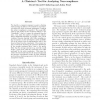Free Online Productivity Tools
i2Speak
i2Symbol
i2OCR
iTex2Img
iWeb2Print
iWeb2Shot
i2Type
iPdf2Split
iPdf2Merge
i2Bopomofo
i2Arabic
i2Style
i2Image
i2PDF
iLatex2Rtf
Sci2ools
AAAI
1996
1996
A Clinician's Tool for Analyzing Non-Compliance
We describe a computer program to assist a clinician with assessing the e cacy of treatments in experimental studies for which treatment assignment is random but subject compliance is imperfect. The major di culty in such studies is that treatment e cacy is not \identi able", that is, it cannot be estimated from the data, even when the number of subjects is in nite, unless additional knowledge is provided. Our system combines Bayesian learning with Gibbs sampling using two inputs: (1) the investigator's prior probabilities of the relative sizes of subpopulations and (2) the observed data from the experiment. The system outputs a histogram depicting the posterior distribution of the average treatment e ect, that is, the probability that the average outcome (e.g., survival) would attain a given level, had the treatment been taken uniformly by the entire population. This paper describes the theoretical basis for the proposed approach and presents experimental results on both si...
AAAI 1996 | Intelligent Agents | Investigator's Prior Probabilities | Major Di Culty | Treatment Assignment |
| Added | 02 Nov 2010 |
| Updated | 02 Nov 2010 |
| Type | Conference |
| Year | 1996 |
| Where | AAAI |
| Authors | David Maxwell Chickering, Judea Pearl |
Comments (0)

